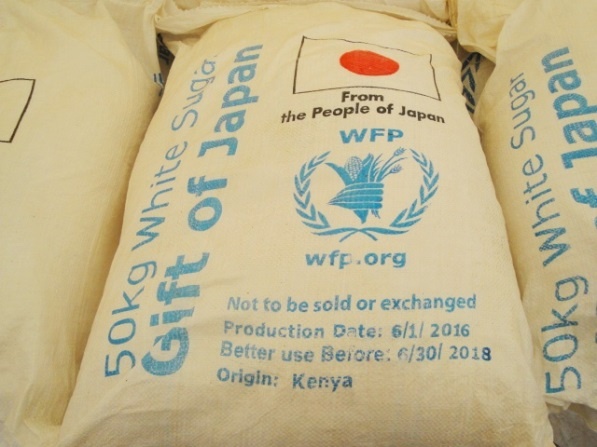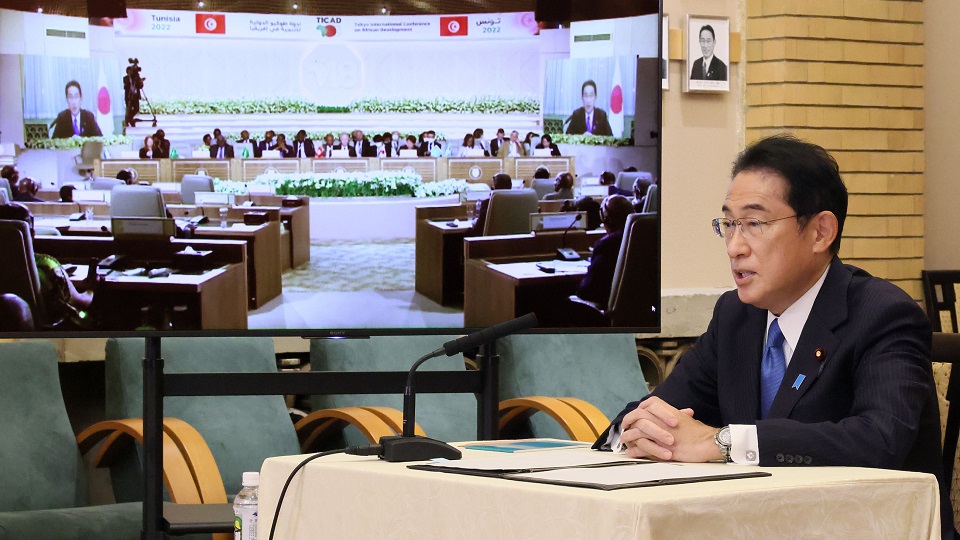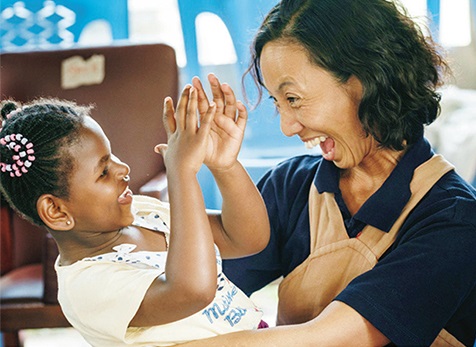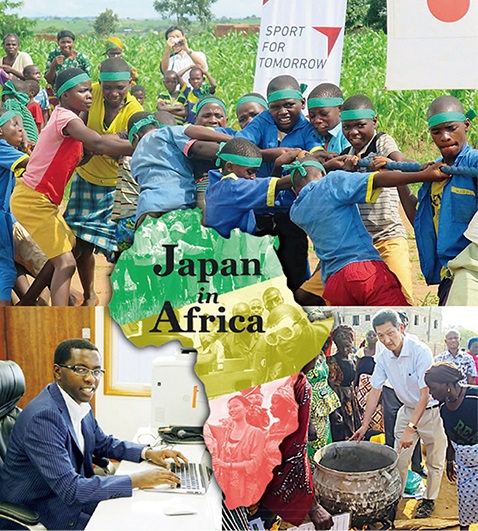Author: Yu Huai
Japan is an important aid donor to Africa. What are the key points of Japan's aid strategy to Africa? How is aid to Africa implemented?
| Japan's aid to Africa |
|
|
What is the main line of Japan's Africa aid strategy?
Africa has rich natural resources, a population of 1.4 billion and the world's largest free trade zone. The region faces huge development challenges. Intensifying conflicts and violence have inhibited Africa's economic development, and climate change has further exacerbated this vulnerability. In 2023, about 462 million people in Africa will still live in extreme poverty. Climate challenges and the COVID-19 pandemic have exacerbated the debt risks facing Africa. The continent's economic growth is unbalanced and infrastructure construction is imperfect. How to effectively develop and utilize Africa's rich resources and expand exports has become an urgent problem to be solved.

(Embassy of Japan in Rwanda/Photo)
Japan's Africa aid strategy focuses on two main lines.The first is the Tokyo International Conference on African Development; the second is to support the African Union's African Continental Free Trade Area (AfCFTA). The combination of the two main lines inherits Japan's traditional foreign aid methods and is closely integrated with Africa's own development policies, enhancing Japan's international influence. Japan's aid strategy to Africa also provides more business opportunities for Japanese companies to explore the African market. Africa's rich natural resources and energy are also one of the important goals of Japan's economic diplomacy in Africa.
The Tokyo International Conference on African Development is a multilateral international conference in support of Africa's development.The Tokyo International Conference on African Development aims to promote Africa's development agenda together with African leaders and other stakeholders, rather than just donor countries providing aid to recipient countries. Since 1993, the Japanese government has invited multilateral institutions such as the United Nations, the United Nations Development Program, the World Bank and the African Union Commission to participate in the Tokyo Conference as co-organizers. Over the past 30 years, the Tokyo International Conference on African Development has been held eight times. As an important framework for deepening Japan-Africa relations, the Tokyo International Conference on African Development has made significant contributions to building trust between Japan and Africa through dialogue. In recent years, the Tokyo International Conference on African Development has moved beyond development cooperation and has shifted to a broader approach such as private sector investment to promote economic and social development in Africa. From 1993 to 2022, Japan has implemented 26 development projects in 20 African countries under the Tokyo International Conference on African Development. The Alliance for African Rice Development (CARD) was announced at the Fourth Tokyo Conference in 2008 to increase rice production by sharing expertise in high-yield rice cultivation methods and irrigation systems to meet the challenges of Africa's population growth. According to data from the Japanese Ministry of Foreign Affairs, during the ten years of the implementation of the Africa Rice Development Alliance, rice production in Africa doubled. Currently, the African Rice Development Alliance aims to double rice production again by 2030.
Main Points of Previous African Development Conferences
| 2022Tunis Conference It was announced that over the next three years, the Japanese government and companies will jointly invest $30 billion to establish a "joint growth partnership" with Africa. |
| 2019Yokohama Conference The Yokohama Declaration 2019 promotes economic structural transformation, improves the business environment, deepens a sustainable and resilient society, and strengthens peace and stability through innovation and business participation. |
| 2016Guinea Conference The "Investing in Africa" and "Nairobi Declaration" were issued. Starting from this conference, the conference will be held alternately in Japan and Africa every three years. |
| 2013Yokohama Conference With a stable and sustainable economy, a resilient society, and peace and stability as the three pillars, the Yokohama Declaration 2013 and the Yokohama Action Plan 2013-2017 were adopted. It has been decided that the government and businesses will invest 3.2 trillion yen (including 1.4 trillion yen in ODA) in cooperation over the next five years to support Africa. |
| 2008Yokohama Conference The meeting announced a number of strategic documents, including a political declaration and action plan for the Japanese government to increase its aid to Africa in the next five years. The Yokohama Declaration adopted at the meeting is known as the political document for Japan's future aid to Africa. |
| 2003Tokyo Conference The meeting clearly supported the "Africa Development Partnership Plan" formulated by the African Union. The meeting adopted the "Declaration of the 10th Anniversary of the Tokyo International Conference on African Development", reaffirming the commitment of all parties to Africa's development. |
| 1998Tokyo Conference The Tokyo Agenda for Action was adopted, which reaffirmed the challenges facing Africa's development and pledged to reduce poverty and integrate Africa into the global economy. |
| 1993Tokyo Conference The Tokyo Declaration on African Development was adopted, pledging to increase aid to Africa. |

(Government Public Relations Online/Photo)
In 2022, Japanese Prime Minister Fumio Kishida announced at TICAD8 in Tunisia that Japan will provide $30 billion for Africa's development in the next three years through "public-private cooperation", focusing on investing in human capital and promoting high-quality growth. Japan will also cooperate with the African Development Bank (AfDB) to provide a loan of about $5 billion to promote sustainable development in Africa by restoring fiscal health. Japan is committed to assisting and supporting Africa in three aspects: economy, society, and peace and stability. In terms of economy, Japan supports strengthening a free and open international economic system and promoting low-carbon transformation and green growth, including supporting and incubating companies committed to solving social problems. In terms of society, Japan focuses on health, health care and education, including supporting Africa's fight against infectious diseases such as AIDS, malaria and tuberculosis, and strengthening the medical system to train 300,000 talents in agriculture, medicine, education and law for Africa. In terms of peace and stability, Japan advocates achieving peace through democracy, promoting the rule of law, preventing disputes, building peace, and strengthening regional stability.
Japan's economic and technical assistance initiatives in Africa
| The financial sector Through the cooperation framework (EPSA) with the African Development Bank, up to US$5 billion will be invested to support the private sector (committed to improving debt transparency, sustainable development and other reforms. Including a special framework of up to US$1 billion established to support the promotion of debt health). Further promote trade and investment in Africa through the memorandum signed by Nippon Export and Investment Insurance (NEXI) and the African Trade Insurance Institute (ATI). |
| human Resources In the next three years, we will train 300,000 talents for Africa in the fields of industry, healthcare, agriculture, justice and administration. |
| Food security and sustainable agriculture Coordinate with the African Development Bank Emergency Food Facility to invest $300 million to support increased food production. Cooperate with the World Bank and the African Development Bank to provide technical cooperation to build a resilient regional food system and strengthen food production. Provide $130 million in food and food aid to Africa. Through the Rice Production Increase Initiative (CARD), train 150,000 people and double rice production (56 million tons) by 2030. Through the Market-Oriented Agricultural Promotion Study (SHEP), support agricultural transformation and create agricultural jobs for 66,000 people. |
| Debt Management We have promoted fair and transparent development finance and carried out talent training in 30 countries. We have also carried out technical cooperation in capacity building in debtor countries by contributing to trust funds of the IMF and the World Bank. |
| AfCFTA and the business environment Establish a bilateral committee to improve the business environment among the four countries to promote the investment agreement. Support the strengthening of logistics infrastructure, the improvement of business-related laws such as competition law, and the cultivation of talent. In collaboration with the World Customs Organization (WCO), capacity building activities were carried out in the areas of trade facilitation, strengthening border management, and enhancing customs collection, including training of 600 trainers. |
| High-quality infrastructure Through digital transformation, we will carry out the "Integrated Corridor Study 2.0" in three key corridors (East Africa Northern Corridor, Nacala Corridor, and West Africa Growth Corridor Loop), improve infrastructure and one-stop border service stations to improve logistics. Cooperate with the African Technical Facilities Forum to promote high-quality infrastructure investment. Support the improvement of international transmission grids, distribution grids, and system stability. Develop the blue economy. Promote sustainable aquaculture and farming, research responses to illegal fishing, and train 200 talents. |
Japan supports regional integration and trade facilitation in Africa.In 2021, the African Continental Free Trade Agreement (AfCTFA) was officially launched. The agreement aims to promote the free flow of goods and services on the African continent and enhance Africa's trade position in the global market. The African Continental Free Trade Agreement is an important milestone in Africa's regional integration and economic transformation. Japan actively supports the African Continental Free Trade Agreement to improve Africa's trade environment. Japan is committed to improving the infrastructure network, promoting the smooth development of trade, supporting Africa in building a one-stop border port (OSBP), and building a regional industrial chain.
How does Japan implement its aid strategy to Africa?
The Japan International Cooperation Agency (JICA) is responsible for implementing aid to Africa.Under the guidance of the Japanese Ministry of Foreign Affairs, JICA is responsible for the specific implementation of foreign aid projects. In recent years, the new crown epidemic, climate change, war and conflict have caused severe challenges to the world, and JICA has accelerated its cooperation with Africa. JICA's assistance and cooperation go hand in hand, not only considering the needs of recipient countries, but also out of Japan's own needs. At present, JICA has 31 offices in Africa, accounting for about 1/3 of JICA's overseas offices, which shows the importance of Japan's aid to Africa. In 2022, JICA cooperated with 54 African countries, with an annual project scale of 226 billion yen (about 1.72 billion US dollars).
Japanese universities and companies, regional and international organizations are involved in implementing Japan's aid to Africa.JICA implements aid projects in Africa in close cooperation with Japanese universities and companies, as well as with regional and international organizations. This format promotes the sharing of best practices between different countries. The Fifth Tokyo Conference in 2013 proposed the African Youth Business Education Initiative. Under this initiative, JICA has selected more than 1,600 African youth to study master's programs at Japanese universities and intern at Japanese companies. Many African youths keep in touch with Japanese companies after returning home. Some young people also start their own businesses or serve as representatives of Japanese companies, becoming a bridge between Japan and Africa.

(Government of Japan/Photo)
JICA supports regional and trade integration in Africa.In December 2022, JICA and the AfCTFA Secretariat signed a Memorandum of Cooperation. The two sides agreed to strengthen cooperation to promote specific activities in the fields of trade facilitation, economic corridor development and the establishment of regional industrial value chains to improve Africa's trade environment. In February 2024, JICA and the AfCTFA Secretariat held their first annual meeting and formally participated in supporting the implementation of AfCTFA. Some African countries also hope that Japanese companies will increase their investment in Africa, but infrastructure and the capabilities required to attract foreign investment have become obstacles to Africa's attraction of foreign investment. JICA focuses on the development of economic corridors by assisting in the construction of ports, roads and power facilities, reducing the gap between coastal and inland areas and between urban and rural areas, supporting the strengthening of infrastructure connectivity among countries on the African continent, and promoting African countries to improve their investment and business environment and increase their attractiveness to private sector investment.
| Japan's aid to Nigeria |
|
|
Japan's Aid to Africa and Its Future Prospects
Japan achieves its diplomatic and economic goals through aid to Africa.By providing aid to Africa, Japan seeks to maintain its influence in Africa and to form a strategic balance with major powers such as China. Strengthening relations with Africa also enables Japan to enhance its soft power internationally and demonstrate and share Japan's long-term commitment to human security and health. Aid in Africa also helps Japan expand trilateral cooperation with partner countries, including the European Union. In addition, through aid to African countries, Tokyo also seeks to gain support for its reform and proposals to become a permanent member of the UN Security Council. In implementing its aid to Africa, Japan helps Japanese companies open up African markets and promotes Japan's diversification of energy and mineral resource sources.
Japan's aid to Africa is expected to increase further.After the COVID-19 pandemic, Japan has stepped up its aid to Africa. Japan expects to continue to deepen its development cooperation with Africa in the coming years. In terms of infrastructure development, it supports sustainable infrastructure for Africa's economic growth and strengthening connectivity within the continent. In terms of human capital development, it supports education and skills development in Africa. In terms of strengthening private sector participation, it further promotes partnerships between Japanese and African companies. In terms of climate change and sustainability, Japan expects to strengthen its support for climate change mitigation and adaptation in Africa, especially in areas related to renewable energy, sustainable agriculture and environmental protection to help African countries improve climate resilience. In addition, Japan will continue to strengthen cooperation with Africa in areas such as digital innovation, peace and security.
References
https://www.jica.go.jp/information/press/2023/20240205_21.html
https://www.mofa.go.jp/mofaj/area/ticad/
https://www.kantei.go.jp/jp/101_kishida/statement/2022/0827ticad8kaikaishiki.html
https://www.jica.go.jp/english/information/topics/2023/20230823_01.html
https://www.mofa.go.jp/policy/oda/white/2021/html/honbun/b1/s2_1.html
https://www.mofa.go.jp/mofaj/gaiko/oda/region/africa/page22_001483.html
https://donortracker.org/donor_profiles/Japan

All rights reserved, please indicate the source when citing.

Comment (1)
Parenting| October 23, 2024
Sustain the excellent work and producing in the group!